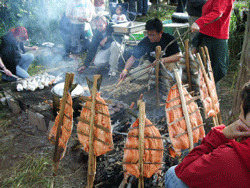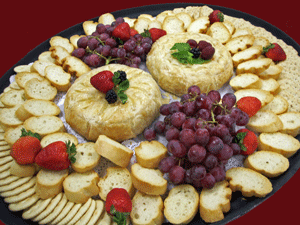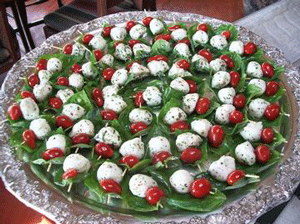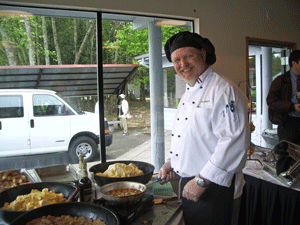
Various job descriptions in the kitchen have been confusing for most people that have not been in the industry. You will find that it is the same in whatever vocation you choose ... there is a "pecking order" to the chaos. In most kitchens, chaos is the correct description, but it is an organized chaos that is stimulating and has been proven over centuries. Without giving you a history lesson on why there are specific titles, I'll give you the quick tour of the kitchen staff. You will find that there are always exceptions and job titles that are unique to a specific culture or even an organization. Here is the hierarchy most commonly used in the USA. This a simplified version:
The names or titles of these positions will frequently changed depending on the organization employing them. Many times if a company is smaller, two or three positions will be combined. The Job Descriptions: Food & Beverage Manager or Director that position is exactly what it says … manager. In the food industry, especially on the corporate level, the top dog in the house is the Food & Beverage Manager or Director. No cooking, usually no menu planning, but focused on keeping the company in the black. They are the accountants of the kitchen. They control the people in the "Back of the House". The Food & Beverage Manager also controls the "Front of the House", this means all aspects of the Dining Room including managers, servers, bartenders, etc... F&B Income: Depends on experience. Sometimes given bonuses on what they save. These bonuses can be higher than their salaries in some situations. They are very motivated. _________________________________________________________ Executive Chef is to spend only 20% of their time actually cooking. The rest is management. Hiring, scheduling, ordering, discipline, politics, you name it, everything BUT cooking for the most part. Of course that depends on the size of the establishment, but that is the job description for 90% of the larger companies. Those companies are looking for qualified people that can manage people and perhaps that is what you’re looking for. Exec Chef Income: Usually highest paid person in the kitchen. This is due to their management ability and their level of responsibility. They can also receive bonuses on their ability to save the company money. This can also be substantial and create a feeling of the staff and inventory being "squeezed" due to those efforts. _________________________________________________________ If you intend to work for a company or restaurant that allows you to cook, then shoot for being the Sous Chef. Sous Chef is to run the kitchen and what it produces. Your job is the quality of the food and the timeliness of getting out there to the public. You spend a large percentage of your time cooking and training staff. Usually in a larger organization, it will be a shift, either morning or evening that you will be responsible for. There can be more than one Sous Chef at an establishment. When I was a Sous Chef, I was one of three. When I owned my own restaurant, I had three. Just depends again on the size of the organization and their needs. A Sous Chef is the top dog just under the Executive Chef. The Exec tells you what to do and you make sure that all the staff do it. It is also where you’ll learn to become an Executive Chef. The Sous Chef does not have the power in most cases to fire an unsatisfactory employee, but they can send them home and let the Exec Chef handle it later. Executive Sous Chef will usually only be found in a larger corporate kitchen. When I was one of three Sous Chefs in the kitchen, I was the head Sous Chef over the others ... that could be also interpeted as an Executive Sous Chef without the pay increase. An Executive Sous Chef could also run the kitchen in its entirety if necessary. Sous Chef Income: usually hourly or salary. Depends on experience, will usually be a little higher than the cook wage. If you're looking for money, learn all you can and become an Exec. _________________________________________________________ Banquet Chef dominates the world of large group meals. This can be in the form of Catering or Banquet Dining. It can also be as a Supervisor over Institutional Cooks. If the company is large enough to sustain a separate Banquet Chef from the Sous Chef, they will usually work with the Catering Director or Executive Chef to provide the needed end result. Responsible for production of food for the specified meals, presentation, setup and delivery of the event. Has a separate staff assigned to them to assist in the production and implementation of the event. As a Banquet Chef, I was responsible for coordinating with the Exec. Chef and the Catering Director. I personally assisted and worked with the Catering Director but touched bases on costing and ordering with the Exec. It was my staff (or myself) that produced centerpiece presentations, layout of service tables, delivery and service of the meal. Of course post cleanup of catering area and catering kitchen was performed by my staff. Banquet Chef Income: Usually hourly or salary depending on experience. _________________________________________________________ Pastry Chef controls the baking world. Cooking and baking are two separate worlds that are closely intertwined. Cooking uses recipes as a guideline to success, in Baking, a recipe is an exact formula that must be followed to the letter and those that can do this are unique. Pastry Chefs can have a complete staff depending on the size of the establishment and financial abilities of the company. In smaller companies they wear many hats and frequently deal with time sharing with cooks who need the same resources as the baker. This is commonly solved by having bakers and Pastry Chefs work during the night when the kitchen temperatures and resources can be controlled by the Pastry people. In most cases your hours start when everyone else is heading to bed. My bakers came in at 10pm and worked until 6:30am, cleaning up and leaving the kitchen clean for the morning restaurant crew coming in to start the days food at 7am. You are responsible for cleaning up your kitchen, counter tops, equipment, tools and floor. Pastry Chef Income: usually hourly or salary, depends on experience and market value. About the same as a cook unless you are managing other bakers whereupon you would receive more to cover that time. Managing others will always require you to use less time baking because you are overseeing the results of your staff. This can be frustrating for those talented Pastry Chefs who would rather do it themselves than to train their underlings. _______________________________________________________ Pantry Chef runs the salad arena. Sometimes called a Garde-Manger. They are the people that create and maintain salads, cold food items and if properly trained, create cold food exhibits such as fruit carvings, ice sculptures, and other presentation items. Unfortunately most culinary schools don't go into this much anymore and those skills are learned in specialty classes at conventions or sought after chef presentations ... even in apprentice type atmospheres. A Pantry Chef can be in charge of a staff of people if the size of the company warrants it. They are responsible for ensuring all ingredients are cared for properly. Refrigeration, preparation and presentation are extremely important. They need to remember that their food items are usually the first things seen by a patron and leave a lasting impression on whether or not they will return to your establishment. Pantry Chefs are also responsible for training and reducing waste of inventory. Pantry Chef Income: usually hourly or salary, depends on experience and ability. Once again, depends on whether they are managing others, otherwise the pay will be commiserate with a cook's pay. _________________________________________________________ Line Cook or Short Order Cook are the backbone of the kitchen. These are the people that make it all happen on the front line. Without them, the establishment would falter. Now that I've built them up, it needs to be remembered that they are not to be creative or expansive. A Line Cook follows orders and is able to handle extremely repetitive procedures in a fluid and fast paced manner. They produce the exact same product time and again and that is key because that product is what the customer expects to receive every time they order it. No special touches unless requested. A line cook knows how a dish is put together and develops the ability to sense the progress of food as it cooks before them. That ability and their skill at space management at their station is what sets them a cut above most other positions in the kitchen. They need to be able to handle multiple tasks or orders at the same time and this takes training and practice. A cook that can't start the next order until the first is done will not only loose his/her job, it will run the business into the ground. Due to the multiple stations on a Cook Line, the size of the establishment and the business demand will determine how many are needed to run that area of the kitchen. If it is large, then there is usually someone on that shift who will act as the Line Manager or Supervisor. This person can also be the Sous Chef or Supervisor for the kitchen. Line Cook Income: Upper range of the kitchen staff, below that of manager positions, but higher than prep or service staff. If well trained, it is a position that can be negotiated based on ability. This person can make or break a fast paced busy restaurant shift. ________________________________________________________ Banquet or Institutional Cooks are cooks that learn how to cook for large groups. They work directly with the Banquet Chef or Sous Chef. This means schools, cafeterias, Casinos, group homes, prisons, receptions, parties or any institution that serves banquet style or cafeteria style food. This means larger portions where the customer either served themselves or was served from food already prepared. It has nothing to do with quality although many may feel that quantity never matches up with quality. That couldn't be further from the truth if you are a Chef that cares what is presented and realizes that their name is on the presentation. As a rule, there is less pressure because you are not trying to create an individuals request. You have more time to prepare because all of your customers are eating at one time. You serve your meal and then you are done and preparing for the next one. Banquet Cook Income: On a par with other Cooks. Middle Range depending on experience. Many retired chefs will assist on a part time basis at a large facility and charge special rates to the company for their skill. Especially with Catering or Special Events. ________________________________________________________ Prep Cooks are the people that assist the cooks and chefs in preparing individual ingredients for food assembly. They clean, chop, dice, steam or boil the raw products so the time of the chef can be more efficiently used. In an organized kitchen, the chef will create a list of items that need to be prepared for the week's menu. In most establishments, there is a set menu and a system is created called a "Par" system. This means that there should always be a set amount of product ready to go for each menu item needed. Since most items can be prepared a few days in advance to a certain point, this system enables the even flow of production throughout the week. Prep Cooks do that preparation and also assist wherever they are needed in kitchen as requested or directed by the Sous Chef. It is also possible in a large kitchen that Station Chefs will have their own Assistants to prep their area. Being a Prep Cook is one of the first steps in learning to be a cook. Many Chefs have started either as a Prep Cook or Dishwasher in their early careers. It is a great way to help you decide if the Food Industry is right for you. It also requires minimum skill to start. Prep Cook Income: Usually minimum wage. _________________________________________________________ Dishwasher is considered by most as the lowliest job on the planet. What is not understood by many non-management people is that having a great Dishwasher can really tie your kitchen together. There are two ways at looking at this position.
If you have been in the Food Industry long enough, you'll know what I'm talking about. How many times have you been waiting for the Dishwasher to finish up so you can go home? In my kitchen, the Dishwasher was assisted by all that were on shift because no one went home until it was all done. No exceptions. So you can imagine how that Dishwasher felt when others had to help him do his job and how the others felt when they had to do his. SO... the Dishwasher that is a Rock Star and hammers his way through his work and provides the cooks with clean pots in record time was rewarded by his teammates. He got special meals, special considerations, shared tips, learned skills because he exhibited ambition and was there for his team. My staff always looked at the schedule and either rejoiced or dreaded who was going to be their Dishwasher. In some kitchens I've managed, the Dishwasher had more years at that position then the cooks. They took pride in their job and ability to out perform those "other" Dishwashers. The front of the house (Dining Staff) also took notice of these people if they were able to provide quick turn around on dishes and utensils needed for their work. Dishwasher Income: Minimum Wage, shared tips, special treatment if earned. |










